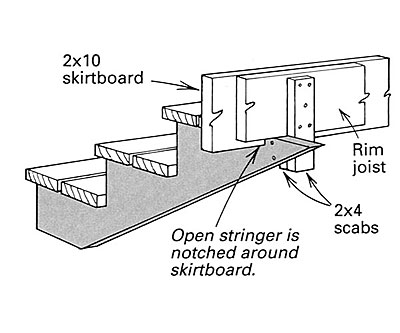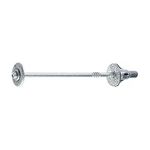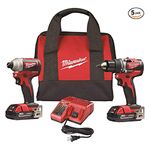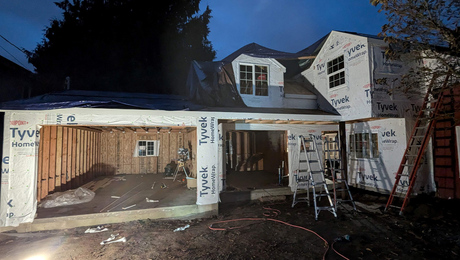Q:
When building exterior stairs up to a deck, we typically use open stringers with a pair of 2×6 treads and a rise of about 8 in. With this construction, the top of the stringer barely meets a 2×10 skirtboard, which we use to cover the rim joist. I’ve tried different methods of attaching stringers without ever being satisfied. The weight of the stairs is exerted against the face of the skirt, and the typical 1-1/2 in. overlap is probably adequate structurally. But the connection must be strong enough to keep the stringer from shifting or warping.
Brian Zaintz, None
A:
Contributing editor Scott McBride replies: I too have hung porch stair stringers on 2×4 scab blocks, and I agree that it seems a rather clunky solution. There are a couple of alternatives.
My first preference would be using a closed stringer. The treads can be supported either on cleats or in routed housings. The closed stringer will bear fully on the rim joist, with plenty of area for toenailing. The closed stringer affords purchase for newels and balusters, as well. Above all, it’s much stronger than an open stringer of the same dimension—an important consideration for stairs with a considerable span. To lighten the appearance of a closed-stringer stair, I use a jigsaw to radius the top corner where it levels off to meet the deck.
If you prefer an open stringer, support it by extending it up into the deck framing. This will require longer stringer stock but will avoid that cobbled look. Extend only the lower third of the stringer’s width, in a 4-in. wide tongue. The strength is in the unbroken lower third of the stringer’s width anyway. You may need to notch the skirt a little to avoid paring down the tongue of the stringer too much.
If the deck joists run parallel to the stringers, you might be able to coordinate joist layout with stringer location. If a stringer falls in the middle of a bay, head off the bay with blocking and frame a short tail joist back from the blocking to the rim joist to pick up the stringer. Nailing in such narrow bays is a pain, so install the stringers from above before you lay the decking.
If the joists run perpendicular to the stringers, install blocking across the first bay to pick up the extended tongue of the stringers.
Fine Homebuilding Recommended Products Fine Homebuilding receives a commission for items purchased through links on this site, including Amazon Associates and other affiliate advertising programs. FastenMaster Screw Bolt Fastening System Drill Driver/Impact Driver 4-Gallon Piston Backpack Sprayer


























